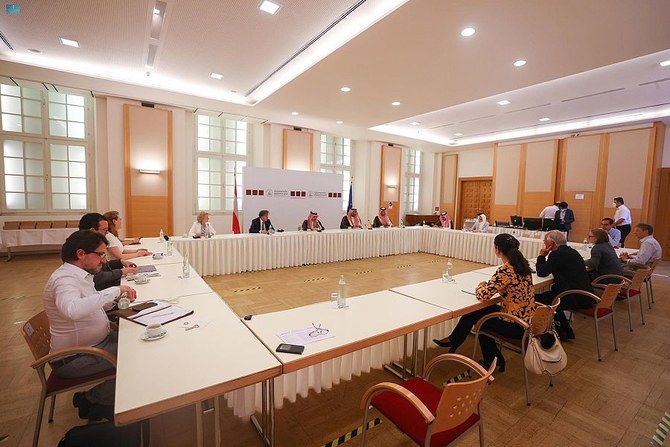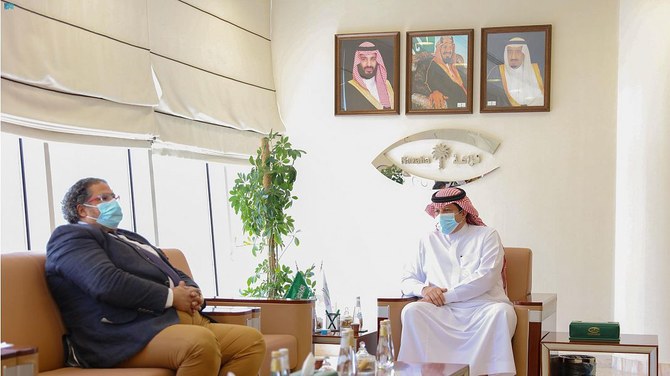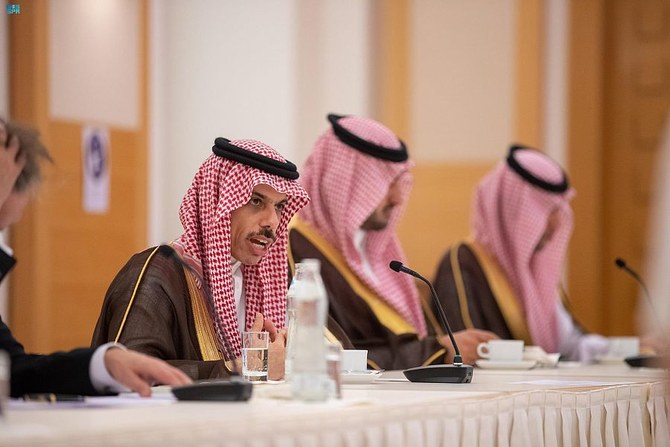LONDON: Saudi Arabian Foreign Minister Prince Faisal bin Farhan met with the Director General of the International Atomic Energy Agency, Rafael Grossi, on Monday during his official visit to the Austrian capital, Vienna.
During the meeting, they discussed developments in the Iranian nuclear program and the need to impose the necessary mechanisms for rapid and comprehensive inspection of all Iranian nuclear sites.
They also discussed the need to stop Iranian violations and policies of international laws that destabilize the regional and international security and stability, the Kingdom’s foreign ministry said.
The two sides also held talks on the importance of adhering to implementing international atomic energy standards, in order to stimulate growth and progress to achieve sustainable development globally, in addition to discussing the most prominent regional and international developments.
#Vienna | Minister of Foreign Affairs HH Prince @FaisalbinFarhan, met with Director-General of the International Atomic Energy Agency, @rafaelmgrossi.
The meeting was attended by HRH Prince @aksa_alsaud, the Kingdom’s Ambassador to #Austria. pic.twitter.com/8YTxGtvLdO— Foreign Ministry (@KSAmofaEN) June 21, 2021
The meeting was attended by Prince Abdullah bin Khalid bin Sultan, The Kingdom’s ambassador to Austria and the permanent representative to international organizations in Vienna.
The Saudi minister also held bilateral talks with the Chancellor of Austria Sebastian Kurz, where they discussed the joint relations between the two countries and ways to develop cooperation in all fields. They also discussed the keenness of both countries leaderships to move forward bilateral relations towards broader horizons, the foreign ministry said.
#Vienna | The Federal Chancellor of the Republic of #Austria @sebastiankurz, receives Foreign Minister Prince @FaisalbinFarhan. pic.twitter.com/1bdH1jADqF
— Foreign Ministry (@KSAmofaEN) June 21, 2021
Prince Faisal also met with Under-Secretary-General of the United Nations and Executive Director of the UN Office on Drugs and Crime (UNODC) Ghada Fathi Waly during his visit.
During the meeting, the two reviewed Riyadh’s initiative to establish the Global Operations Network for Anti-Corruption Law Enforcement Authorities (GlobE), which was launched on the sidelines of the UN General Assembly Special session against corruption in early June.
The two sides also discussed ways to enhance joint coordination between the Kingdom and the UN on issues of common interest.
#Vienna | Minister of Foreign Affairs Prince @FaisalbinFarhan, met today with Executive Director of the United Nations Office on Drugs and Crime (@UNODC) & Director‑General of the United Nations Office at Vienna, @GhadaFathiWaly, during his official visit to Vienna. pic.twitter.com/kjrp3t7fVS
— Foreign Ministry (@KSAmofaEN) June 21, 2021
On the sidelines of his visit, the Saudi foreign minister visited the Diplomatic Academy of Vienna, where he met with the academy’s president Dr. Emil Brix, and a group of intellectuals and opinion leaders in Austria.
They then held a panel discussion to discuss the Kingdom’s efforts to support coexistence, peace and moderation through all diplomatic means and dialogue. Prince Faisal also spoke about the “importance of solidarity among the countries and peoples of the world to face common humanitarian challenges,” and reviewed the Kingdom’s firm positions that aim to bring regional and international security, stability and prosperity.
He said the role of the Kingdom’s Vision 2030 in promoting the concept of peace, coexistence and sustainable development, which will be reflected on the region and the world and would increase investment opportunities and cooperation with world countries.

Saudi Arabian Foreign Minister Prince Faisal bin Farhan visits Diplomatic Academy of Vienna, where he met with the academy’s president Dr. Emil Brix, and a group of intellectuals and opinion leaders. (SPA)
Prince Faisal added that the Saudi Green Initiative and the Middle East Green Initiative will enable the Kingdom to be a regional leader in protecting land and nature, place it in a road map with clear and ambitious milestones, and will strongly contribute to achieving global goals.
He called for promoting the concept of peace, encouraging relations of mutual respect, settling conflicts by peaceful means, and promoting dialogue and solidarity among different civilizations, peoples and cultures.
Meanwhile, Mazin bin Ibrahim Al-Kahmous, president of the Oversight and Anti-Corruption Authority (Nazaha), held talks with the UNODC Regional Director for the Gulf Cooperation Council Dr. Hatem Ali at the authority’s headquarters in the Saudi capital, Riyadh.
During the meeting, they discussed ways to enhance cooperation, issues of mutual concern, and the strategic partnership between Nazaha and the UNODC.
Ali praised efforts made by the Kingdom in the field of combating corruption and promoting the principle of transparency, adding that the Kingdom has led the world by establishing the GlobE network.

Mazin bin Ibrahim Al-Kahmous, president of the Oversight and Anti-Corruption Authority (Nazaha),meets UNODC Regional Director for the GCC Dr. Hatem Ali. (SPA)


































